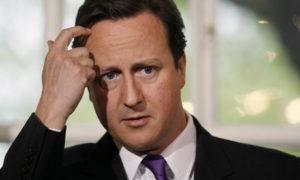
Mentre il primo ministro volava a Belfast con la sua controparte irlandese, Brian Cowen, per cercare di salvare l’Esecutivo, fonti del governo britannico hanno espresso profondo disagio per l’approccio dei Tories.
Brown sta cercando di ottenere un accordo tra lo Sinn Fein ed il DUP per trasferire i poteri su polizia e giustizia in Irlanda del Nord. Ha parlato ai suoi collaboratori del suo stupore dopo aver appreso della riunione di membri dei Tories con gli unionisti, avvenuta in una proprietà in Inghilterra.
Peter Robinson, leader del DUP, ha partecipato a colloqui con importanti membri dei rivali Ulster Unionist a Hatfield House, nell’Hertfordshire, nel fine settimana del 16 e 17 gennaio. Il Marchese di Salisbury, attualmente a capo della dinastia, era il membro più pro-unionista del governo di John Major.
I colloqui, ai quali è intervenuto il Segretario di Stato Ombra, Owen Paterson, hanno sollevato la speculazione secondo cui i Tories stanno cercando di creare un fronte pan-unionista per limitare il successo dello Sinn Fein e dell’SDLP alle elezioni generali.
I Tories hanno già stretto un patto elettorale con gli Ulster Unionist per presentare candidati condivisi per i 18 seggi nordirlandesi per Westminster.
Una fonte governativa riferisce: “Siamo semplicemente stupefatti per quanto stanno facendo i Tories. Il processo di pace in Irlanda del Nord è stato rinforzato dall’approccio bipartisan tra tutti i maggiori partiti a Westminster. Tenere incontri in un palazzo – escludendo i nazionalisti – non segue assolutamente tale spirito”.
Alasdair McDonnell, numero due di SDLP, ha detto: “Questo è uno sviluppo davvero sinistro. Sta mettendo in pericolo il processo di pace. Abbiamo attraversato 15 anni di costruzione della pace e adesso siamo al punto di mettere l’ultimo tassello del mosaico. Ora abbiamo Cameron che si paracaduta con gli scarponi chiodati e va in un angolo con due partiti, escludendone altri tre”.
Una fonte afferma: “I colloqui sono stati un tentativo genuino di accelerare gli incontri sulla devolution. Sappiamo che i due partiti sono riluttandi ad andare avanti su questo. L’unico patto è l’accordo con l’UUP di presentare 18 candidati dei Conservatives e unionisti alle elezioni generali”.
La discussione si è infuocata all’arrivo di Brown e Cowen a Hillsborough Castle per i colloqui.
Martin McGuinness, vice primo ministro dello Sinn Fein, si è detto frustrato per la mancanza di progresso politico dopo un incontro con Robinson, avvenuto all’ora di pranzo. Lo Sinn Fein aveva descritto tale incontro come “critico e definitivo”.
Il partito repubblicano è sotto crescente pressione, volta a far crollare la storica coalizione con il DUP. Lo Sinn Fein attacca il partito di Robinson per la sua ostinazione sulla devolution dei poteri di polizia e giustizia, ritenendola la causa principale della crisi.
Tratto da Guardian
Gordon Brown believes Conservatives endangering Northern Ireland peace
As the prime minister flew to Belfast tonight with his Irish counterpart, Brian Cowen, to try to rescue the power-sharing executive, senior British government sources expressed deep unease at the Tories’ approach.
Brown is attempting to broker a deal between Sinn Féin and the Democratic Unionist party to devolve policing and criminal justice powers to Northern Ireland. He has told aides of his astonishment after the Tories convened talks among unionists at an English country estate.
Peter Robinson, the DUP leader, joined talks with senior figures from the rival Ulster Unionist party at Hatfield House in Hertfordshire, the country seat of the Cecil family, over the weekend of 16-17 January. The Marquis of Salisbury, the current head of the family, was the most pro-unionist member of John Major’s government.
The talks, convened by the shadow Northern Ireland secretary, Owen Paterson, prompted speculation in Northern Ireland that the Tories are attempting to establish a pan-unionist front to limit the success of Sinn Féin and the SDLP in the general election.
The Tories have already formed a pact with the Ulster Unionist party to put up joint candidates in Northern Ireland’s 18 parliamentary seats.
One senior government source said: “We are simply astonished at what the Tories are doing. The Northern Ireland peace process has been strengthened by the bipartisan approach between all the major parties at Westminster. Holding talks at a country estate – and excluding the nationalists – is absolutely not within that spirit.”
Alasdair McDonnell, the deputy leader of the SDLP, said: “This is a very sinister development. It is endangering the peace process. We have travelled far over 15 years of peacemaking and we are now at the point of putting in the last piece of jigsaw. What we have is Mr Cameron parachuting in with hobnailed boots and going off into a corner with two parties and excluding three others.”
One source said: “The talks were a genuine attempt to steady the talks on devolution. We know that the two parties are reluctant to move ahead of each other on this. The only pact is our agreement with the UUP to put up 18 Conservative and unionist candidates in the general election.”
The row came as Brown and Cowen arrived for talks at Hillsborough Castle.
Martin McGuinness, the Sinn Féin deputy first minister, said he was frustrated over the lack of political progress after a lunchtime meeting with Robinson. Sinn Féin had earlier described the encounter between McGuinness and Robinson as “critical and defining.”
The republican party is under increasing pressure to pull out of the devolved government and bring the historic power-sharing coalition down. It blames the DUP’s obstinacy over policing and justice as the main cause for the crisis.